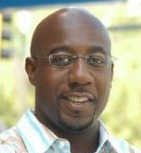By Bob Allen
Faith leaders urged voter awareness in 24 states that are refusing to expand Medicaid under the Affordable Care Act in a conference call with reporters May 29.
 “History has not been kind to governors who stand in front of schoolhouse doors because the children are not the right kind of children, and history will not be kind to governors who stand in front of hospital doors and clinics because people who are trying to get in are deemed politically dispensable,” said Raphael Warnock, senior pastor of Ebenezer Baptist Church in Atlanta.
“History has not been kind to governors who stand in front of schoolhouse doors because the children are not the right kind of children, and history will not be kind to governors who stand in front of hospital doors and clinics because people who are trying to get in are deemed politically dispensable,” said Raphael Warnock, senior pastor of Ebenezer Baptist Church in Atlanta.
Part of the Affordable Care Act’s plan for universal coverage includes expanding eligibility for Medicaid, a government health insurance program for low-income families and individuals. The federal government offered to pay 100 percent of the difference between a state’s current Medicaid eligibility level and the Obamacare minimum from 2014 to 2017 and 90 percent after 2020.
As originally written, states refusing to expand their program to the ACA minimum would lose all federal Medicaid funding. The U.S. Supreme Court ruled in 2012, however, that the federal government could not withhold the funding, in effect giving each state the right to opt out of expansion.
Several Republican governors and GOP-controlled legislatures have indicated they intend to do just that, claiming their states cannot afford the expansion. Critics call it an effort to obstruct implementation of Obamacare by refusing federal money for partisan politics.
Jennifer Butler, founding CEO of Faith in Public Life and convener of Thursday’s call, termed the situation “a moral crisis that is leaving millions of Americans without the health care they deserve.”
“This is not a simple political agenda like more roads or less roads,” added Sister Carol Keehan, CEO of Catholic Health Association. “This is people’s lives at stake.”
Warnock, among 39 Moral Monday protestors arrested in March in an act of civil disobedience urging Gov. Nathan Deal to expand Medicaid and protesting efforts to pass legislation to block him from doing so, said about 600,000 Georgians are in the “Medicaid gap” that could be closed with action by state lawmakers.
“These are not numbers,” Warnock said. “These are our neighbors.”
Warnock, pastor of the home church of Martin Luther King Jr., said it has probably been 50 years since Georgians have witnessed the kind of gridlock now going on between the state and federal governments.
“This is a kind of obstruction that we have not seen,” he said. “It is not just politically wrong; it is morally wrong.”
“It is not the difference between left and right,” Warnock said. “It is the difference between right and wrong.”
